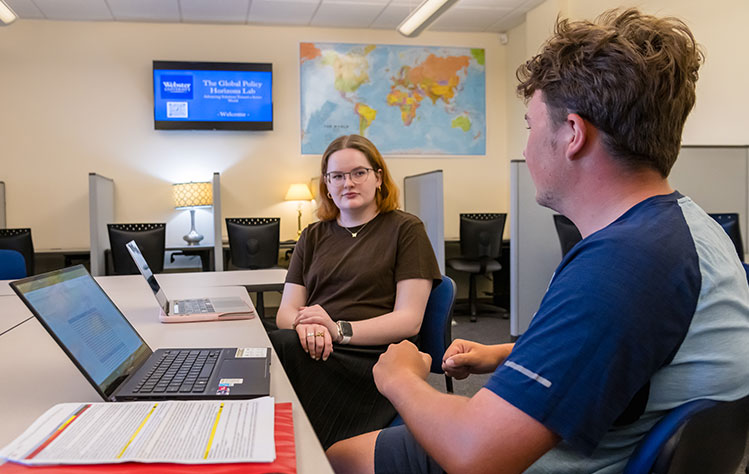Webster’s Global Policy Horizons Lab Expands Research and Partnerships
September 09, 2024

The Global Policy Horizons Lab at Webster University continues to grow as a leading center for cutting-edge policy research, now comprising eight student researchers and welcoming external fellows to deepen its expertise.
Known for its focus on global security challenges, the lab is expanding its influence by tackling pressing international issues. Founded to provide a platform for advanced policy analysis, the Global Policy Horizons Lab focuses on international security and geopolitical dynamics. It supports student researchers in conducting high-impact, policy-focused studies, fostering collaboration with scholars, policymakers and global institutions. The lab’s work spans key areas such as deterrence, unconventional security threats, human security, regional conflicts and threats, as well as conflict management.
In recent years, the lab's publications have garnered positive responses from members of national and international policy communities. As a testament to the quality of their work, students from the lab are preparing to travel to Chicago for the International Studies Association annual convention, the largest conference of its kind, where they will present their research. Additionally, the lab is partnering with the Canadian Global Affairs Institute in Ottawa, Canada, to submit policy analysis papers addressing urgent global security challenges.
Josh Hayes, is a senior researcher who has been with the lab for over a year. Hayes, who studies the Israel-Gaza-Hezbollah conflict, is eager to build on his previous research. "The lab has been an incredible platform for digging deeper into the complexities of Middle Eastern security. This year, I’m excited to further explore how shifting alliances are influencing conflict patterns and security outcomes in the region," Hayes remarked.
Samantha Ramay, a long-standing member of the Lab, focuses on Iran’s aid to Hezbollah and its implications for local security. "Understanding how state-sponsored support shapes non-state actors like Hezbollah is crucial for predicting future instability in the Middle East. My research will delve into how Iran’s involvement is altering the security landscape," Ramay explained.
The lab has also welcomed Xine Straw, who will examine the role of corporatism in Latin America and its effects on human security and political stability. "There’s a growing intersection between corporate power and political stability in Latin America. I aim to explore how these dynamics contribute to—or undermine—human security," said Straw.
Graduate student Maya Asadova is joining the lab to explore security challenges in Central Asia. "Central Asia is an increasingly pivotal region, and I’m excited to contribute to the lab’s expanding focus. My research will look at how geopolitical tensions are shaping security policies across the region," Asadova said.
The lab has also onboarded Grace Shipley and Libby Stiles from Webster’s English Department, who are completing a practicum on grant writing. This practicum not only strengthens the lab’s capacity to secure funding but also opens doors for students interested in pursuing careers in grant writing, offering them practical experience in crafting successful proposals.
The lab is actively seeking to expand its partnerships across the international network of Webster University campuses and other global institutions to enhance its research capacity. The Global Policy Horizons Lab offers an excellent jump-start for students seeking careers in international security and public policy at both the national and international levels. With its growing team and partnerships, the Lab is positioned to continue shaping important policy discussions in the years to come.
The Global Policy Horizons Lab offers an excellent jump-start for students seeking careers in international security and public policy at both the national and international levels. With its growing team and partnerships, the lab is positioned to continue shaping important policy discussions in the years to come.
For more information, visit the lab's webpage or contact Dani Belo, PhD, at danibelo@webster.edu
